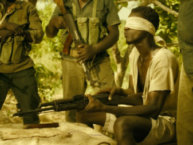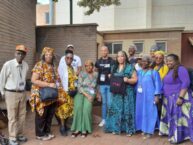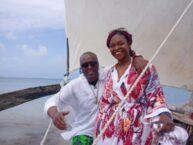 Aito Osemegbe Joseph works as a Sales Professional during the day and at dusk, writes horror stories and psychological thrillers. His short stories have appeared in ‘Brittle Paper’ and ‘Kalahari review’. He is set to publish a collection of short stories and is currently working on his debut novel.
Aito Osemegbe Joseph works as a Sales Professional during the day and at dusk, writes horror stories and psychological thrillers. His short stories have appeared in ‘Brittle Paper’ and ‘Kalahari review’. He is set to publish a collection of short stories and is currently working on his debut novel.
The one I once called my daughter haunts me now. While my family sleeps peacefully in the hours before a new day is fully born, she saunters in and tortures me with her soft smile. Up until six months ago, Adaeze’s smile did not have such power. Up until six months ago, we all preached the same message to Adaeze, but did she hear word?
Marry an Ibo man.
Marry a strong, rich Ibo man.
Marry a man whose parents are Ibo.
She had refused.
She would say Chris is this and Chris is that, that our opinion did not matter. But it came to matter when it was time for the native wedding, the giving away, in her father’s compound in Ogudu, Lagos. She was in the room waiting to be called upon. The guests sat under canopies in the field outside the house, already feasting while we, her fathers, made the transactions of her head, deciding her fate. The decision-making shouldn’t have been harder than it usually was, but for goodness’ sake, her Chris did not even know that ‘mba’ meant ‘no’ and all he wanted was a ‘Yes’ from us. I taught him the word and the first sentence he makes with it?
“Mba Sir, we don’t live in America,” he said, interrupting me. “We’re from London and we live right there, sir.”
I just smiled and pretended not to notice his mother nudge him in the side. I decided to put the arrogant boy in his place. After all, when a child rubs his father’s face with fingers extracted from the anus, then is the right time for a merciless beating of those buttocks.
“Young man, don’t you know that when an Elder farts, the children around must perceive the smell in silence? Whether it is London, Canada, Italy, Portugal, China or Japan, everything is ‘America’. A white man’s land is a white man’s land.” As I spoke, the whole sitting room erupted in laughter. I wasn’t assuaged by the forced laughter. I straightened the paper in my hands (before Chris spoke, we had started verifying the wedding list printed on this paper), turned away from him and faced the dining table where the gifts were heaped. Adaeze’s younger brother, Uchenna, stood beside this heap alongside Chris’ younger brother, Oliver. The duo nodded, signifying their readiness to continue the list verification.
“Forty tubers of yam,” I called out.
“Complete!” Uchenna shouted in reply, after a meticulous count.
I wondered if the hard times caused by the crash of oil prices had hit London also. No, I prayed it had hit them so bad they would default on at least one of the items. I continued with the list, silently swearing that if just one carton of anything wasn’t in that heap, they would smell their behinds.
Two packets of Cabin biscuit.
Complete.
Twenty-four tins of Dusting powder.
Complete.
Five jars of Stella pomade.
Complete.
Ten packets of St. Louis Sugar.
Complete.
This far into the list and these people hadn’t missed out a single item yet. I looked at the young man, Chris or whatever he called himself, his mother, and the hoard of the others that came from the United Kingdom with him. All of them, speaking as if from their noses, chattering on without respect. I was tempted to tell them to get out of the house and return when they were ready to marry, but the look on the face of Adaeze’s father, Mazi Okonkwo, begged me to bear with their interruptions and unwholesome chatter and get it all done with. The old man was tired; he had let his daughter strong-arm him into giving his consent to the marriage. I went on.
Two big-sized Ovaltine.
One carton of Peak milk- powder.
Twenty-four loaves of bread.
Twenty-four cartons of malt.
Two bags of salt.
One big tray of stock-fish.
One 25kg keg of palm oil.
One 25kg keg of groundnut oil.
One 25kg keg of kerosene.
They had brought two kegs of palm oil, groundnut oil and kerosene each.
“This is insulting. We asked you people to bring one keg and you bring two? Are you saying you know more than us? Or you think we are begging you people?” I asked Uchenna and Oliver to shift the extra kegs towards Chris’ people. Even though I noticed that Chris’ jaw was tightly clenched and he was silent all the while, his people apologized for the oversight, I forgave them and went on with the list.
A basket of onions.
Two 25kg bags of rice.
One thousand, fifty Naira for the bride price.
One thousand, five hundred Naira for the village youths.
Ten thousand Naira to bring the pot down from fire.
I didn’t care if they understood what ‘bringing the pot down from fire’ meant. I saw no reason to explain. They want to marry an Ibo girl and they can’t speak Ibo. Nonsense. When they come for our festivals and parties, will they call me to come sit beside them to interpret? Common sense should tell them that for more than two decades we have cooked a delicious meal, it is not empty hands we’d use to bring the pot down.
Two big-sized stainless steel basins.
Two big umbrellas.
Two George materials.
Two Hollandis materials.
Two blouse materials.
Two head ties.
One wristwatch.
Two pairs of shoes.
One big box.
One lamp.
One handbag.
Six yards of Nigerian wax.
Pa Ezekiel, the oldest amongst us, the man who was to give the village’s blessing on the couple, looked worn out too. The edge of his lips curved downwards and his eyes were distant as if he was looking at the future of the union of these two very different families. Like the rest of us, he had tried to convince Adaeze to avoid this mistake by bringing good men to her feet, threatening and raising hell, reminding her of the fate of her cousin Uluomachi who had married a Yoruba man and had become his mortar, only good to be pummeled with the pestles he called his hands. But our Adaeze didn’t hear word.
The boy, Chris, was as black as any Uchenna or Chibueze could be and he would have passed for one, until he let words roll off his quick tongue. His Best-man was worse. This one spoke so fast, I doubted that he could understand himself. Quick as their tongues were, they had never known the joys of Nsala soup or of the legendary Ogbono soup. These ones hadn’t begun living yet. They had been fortunate to win Adaeze’s heart in the one year that she had spent studying in the United Kingdom, opting for her instead of their lean girls that look like starved thirteen-year-old boys. It was a good thing for them, surely, but we couldn’t say the same thing for Adaeze or for us, her family.
Our Adaeze had come back with a Master’s degree in Operations Management and a boy. This boy, Chris. I let my eyes linger on the scar that made a short dash across his left cheekbone. Had he earned that in a brawl? Was the scar a gift from a disgruntled lover he had previously beaten up? But our Adaeze had refused to see these things. She was the stubborn fly that was following the corpse right into the grave. Even the good book had said that ‘There is a way that seemeth right unto a man, but the end of it is destruction.’ Adaeze would say, “But Uncle, you’re not my father.” What she failed to accept was that I was her father and she was daughter to every single one of her uncles. She knew that among us the Ibos, when an arrow kills a game, the hide is for the shooter but the meat is for all and that when we marry a person, we marry the family also. She didn’t realize that this stupid decision of hers would break her father’s heart and mine as well.
I remembered my conversation with Adaeze’s father the night before, as we sat at the backyard and stared into the dancing flames of the firewood over which the women cooked in preparation for the festivities.
“My brother, I have decided to accept my daughter’s decision, but I still have concerns. Has Adaeze thought of how Chris will cope during Christmas celebrations in the village? When young men of his age-grade compete in wrestling matches, will he join them or be in a corner smoking his American cigar? Will he join us when we all gather to eat from the same bowl? When we roll perfect balls of hot garri with our trained palms, will he ask to use a fork?” The crackle of burning wood filled the night as he shook his head in worry. “How will he and his people handle our ways?”
I had no reply for him, but those words stayed with me. I wasn’t sure Adaeze understood these things the way we did; the complexities of multiracial family relationships. But these were the simple problems Mazi Okonkwo had raised. The hard ones made me shudder. What would she do when she has to flog her child to correct some wrong-doing and Chris disagrees? They would begin to argue what child abuse is and what it isn’t. How would they cope with our loud and ecstatic version of Christianity? When the young boys jam their hands non-stop in rhythm with the drum beats and then Mama Nkechi starts rolling on the floor, howling and screaming in the spirit, would they even understand? How would they feel when they were at one of our parties where no one ever remembers to speak English? I fought a good fight. I did everything I could to dissuade Adaeze from mixing blood with these strange people right until that moment I read out the list. I continued reading, slow and sad, dreading every second that brought the impending doom closer.
Ten thousand Naira for the siblings of the bride.
Complete.
One carton of Canoe soap- the unwrapped one.
Complete.
One thousand, two hundred and fourteen Naira for the mother of the bride.
Complete.
Two big goats.
“Tied to the mango tree in the backyard,” Oliver called out in response.
We couldn’t accept word-of-mouth testimony, so a delegation of six had to go confirm; three from our family and three from theirs. But before we went to the backyard, I gave another speech.
“All these things on this list and our strict adherence to it is not us selling our daughter out to you. It is tradition that has been passed down for centuries.” After a round of applause, we proceeded to the backyard to check the goats, and till today, I wish things had gone differently.
When we reached the tree where the goats were tied, I saw an opportunity but the words came out of my wife’s mouth first.
“Eeeehhhhhhh, what is this? We asked for goats and you people are here with rabbits.” She struck her open mouth with her palm repeatedly, making mocking noises.
“Blimey! Fighting over the size of goats? What kinda primitive people are these?” Oliver blurted, unable to rein his disgust.
“Primitive? You call us primitive? Do you have Elders where you come from? You just disrespected these grey hairs on our heads, but I don’t blame any of you. I don’t. You have come all the way from London to play but now you can see there are no swings and bouncing castles around…”
“What’s this Codger saying? Bollocks!” Oliver shot out, rudely interrupting me while breaking free from his mother’s withholding grasp. “What’s so bloody special about their daughter, yeah? My brother just had to want a minger, yeah?”
Adaeze’s brothers and cousins fired back immediately, flinging curses without restraint.
“Look at you people. Blowing big grammar on top empty pockets. Simple bride list you cannot bring and you’re opening rotten mouth to insult your generation,” Uchenna blared.
Chris’ people didn’t hold back either. They joined Oliver in hurling slurries of nasal retorts interspersed with ‘innits’ and ‘gonnas’ and ‘yeahs’. Insults which we barely understood anyway. In all of these, Chris and his mother remained quiet.
The guests close enough to hear the squabble joined us at the backyard and the sound of angry voices escalated. I noticed Adaeze at the backyard window, peeping. She jumped out of view when our eyes met.
With the loudest voice I could muster, I hushed every other person and spoke the words; the words of doom, “You people should leave here and return when you’re ready to marry.”
The silence grew intense and I could see Adaeze’s father plead with his eyes. Everyone focused on me, and the mouths that were running sharp a moment ago started to quiver. In several past marriages, we would get to this point and the begging would begin. They would kneel and make several promises and then I, the Whirlwind of Umuchoke, the speaker of the village, would tell them to calm down. I would tell them that the marriage list is part of our culture, and that the haggling was designed to build rapport between the marrying families. I would give this speech, round up with the marriage list and move on to the prayer of the oldest clan man. This was our way.
But, these people did not beg. This was final proof of how ignorant they were of our ways. I watched the angry look on their faces transform into that of surprised shock. I hid my own surprise. Had they not thought to bring someone along to tell them how we did these things? Someone old and wise enough to advise them on the right way to please their future in-laws? I watched the boy’s face tighten, his teeth clenching on his lower lip and his jaws pulsing. At that moment, he didn’t look like a little boy anymore. The fire in his eyes blazed and I knew hell was close by. No one attempted to break the silence and it seemed everyone’s gaze had shifted to Chris. We watched as the boy stretched trembling hands towards the backyard door, towards Adaeze. Our gaze shifted towards the door and we caught the tears on Adaeze’s face before she backed out of view again.
Chris walked boldly into the house and like an animated crowd we followed him. When we got into the sitting room, we saw that Adaeze had her arm in Chris’, the duo walking towards the front door. We followed them outside and stood, watching as they passed the surprised crowd seated under the canopies, past the compound gate and out of sight. It was at this point that we woke up. Mazi Okonkwo, Adaeze’s father, was the first to bolt for the gate. I followed quickly and I heard many footsteps and murmurs coming behind me. It was barely ten seconds after Adaeze and Chris stepped out, but we didn’t see them anywhere along the street, no trace of them, and that was the first of the unfortunate events to come our way.
At first, all we felt was rage. We shooed Chris’ people outside the compound and for the next few days we tried to get over the insult of Adaeze and her stupid boy walking out on the family and all the guests. I was the family’s hero. I had told the cheap Londoners off and upheld our pride and culture. Over the next few days, all the family members returned to their homes. Some returned to our place in Umuchoke village, others returned to places as far away as Kano but most of us who were now based in Lagos didn’t have far to go. I was one of the last to leave Mazi Okonkwo’s compound, because we were neighbours and I just needed to walk around the fence.
When Adaeze refused to return home after one week, things changed. From hero, I became the villain. Faces frowned whenever I showed up, and whispers hushed when I stepped into a room. The faces of those who had supported me in sending Chris’ family off became coloured with disdain.
My wife would mutter and grumble when she returned from the nearby hair salon, relaying gossip. “I heard that Mazi Okonkwo’s wife has been talking about you, saying you are jealous of her daughter’s success and pride pushed you to take a poor decision.” She would refuse to look me in the eye while saying these things. “You really should have stopped them from leaving.” The other day she came home crying, she had watched in dismay as Uchenna swore to disrupt the weddings of our daughters in fair revenge. “Go and beg your brother,” she pleaded. “You did wrong. Accept it like a man and go and beg all of them, please”.
Adaeze sent a Facebook message to Uchenna two weeks after her disappearance: Tell ‘em gudbye. When Uchenna relayed the message to the rest of the family, there was wailing. Adaeze’s mother held my shirt to the neck, pushed me against the wall and shook me violently, demanding her daughter from me. Mazi Okonkwo asked that I leave their house and only return if I was sent for. My own wife and children gave me foul glances and took sides with the rest of the world. For goodness sake, I had only done what I always did. I had only spoken the mind of every true Ibo man.
After loads of messages the family sent to Adaeze via Facebook and e-mail, she replied with another Facebook message, much longer than the previous one, and even though Mazi Okonkwo didn’t let me see it, I knew the details from overhearing them talk about it. Adaeze had moved with Chris to Berlin, Germany and wasn’t sorry for walking out on us. She had gotten a job with KPMG, an auditing firm, and was looking to begin a PhD programme soon. And most shocking, she was two weeks pregnant. No one complained that an unmarried girl was pregnant; instead, they offered a thanksgiving mass in church on her behalf, praising God for her safety. The messages came in fortnightly and the reading became a regular part of our family’s monthly meetings. Uchenna’s phone would be passed from person to person while nsala soup and garri went around in trays. They admired her Berlin pictures and read the messages with joy, but somehow, the phone never got to my hand. No one was sure how much more havoc I could cause by touching the phone or seeing the pictures. I didn’t complain, satisfied with hearing them talk about our estranged daughter.
It was six months after she disappeared that I saw Adaeze again. In the early hours of the morning, before the darkness drifted away with the cock’s crow, and before the noise of crying babies and clanking pots filled the air, she walked in through the door, smiling at me. She didn’t say a word but her smile told me a thousand things. It told me that she had learnt her lesson and would come back home to marry a proper Ibo man. I smiled in response and like a fading dream she walked out the door as quietly as she had come in. Same time, every morning, she visits and together we go over that terrible day that she walked out on the family. We talk about how things could have turned out differently. But when the darkness fades and the bright light of day floods my mind, I know the visits are just a taunting mirage, a recurrent dream.
“I’m worried about you.” my wife said to me two nights ago, as we lay in bed. “You talk in your sleep. You walk around, talking to yourself. Adaeze this, Adaeze that. Biko, I am worried, isn’t this issue affecting you too much?”
I stared at the lowered flame of the kerosene lantern on the table, her words echoing in my mind. Adaeze this, Adaeze that. Was I slowly running mad because of guilt? No way, Tufiakwa! I did what was right.
When I didn’t reply, she hissed and turned around to face the wall. “My own is, stop this behavior. And don’t wake me up with your mumbling again.”
It’s 4a.m. in Ogudu, Lagos. I lie in bed, my wife’s back warm against my body, and watch Adaeze walk in through the door again. Her smile is derisive but it will not dissuade me from reminding her of all the warnings we gave her. Once again, I will remind her that all of the sorrow she has brought upon us is because she refused to hear word.





